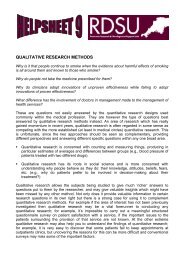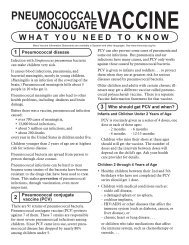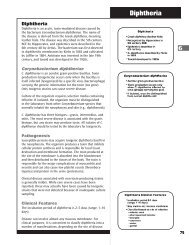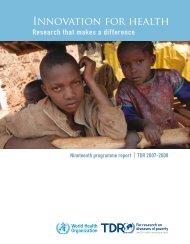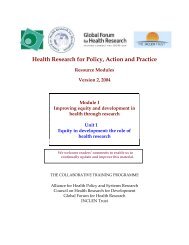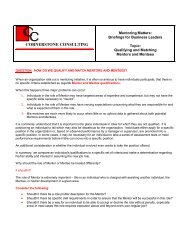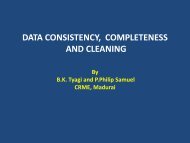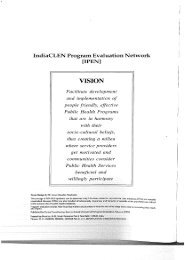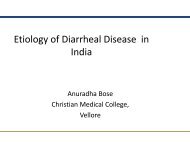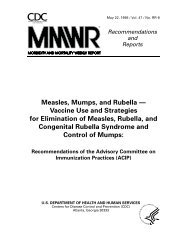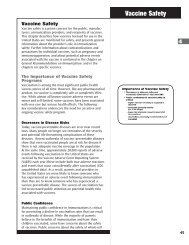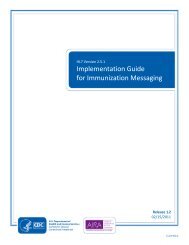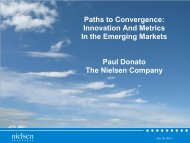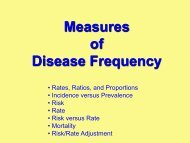Developing a Mentoring Program - The INCLEN Trust
Developing a Mentoring Program - The INCLEN Trust
Developing a Mentoring Program - The INCLEN Trust
Create successful ePaper yourself
Turn your PDF publications into a flip-book with our unique Google optimized e-Paper software.
School of Sciences/Nursing <strong>Program</strong>/DOL Retention <strong>Program</strong><br />
D EVELOPING A MENTORING PROGRAM<br />
<strong>The</strong> Community Nurse Mentor <strong>Program</strong> is a program to provide community nurse support to nursing students from their<br />
first course in nursing school to their 1 st year of employment. This program is predicted to improve retention and job<br />
satisfaction. <strong>The</strong> mentoring program was developed through an extensive literature review in which the mentor education<br />
packet, mentor/mentee match profile forms, and program evaluation tools were based on.<br />
Nurses who are working professionals are recruited to support nursing students. <strong>The</strong> program highlights the relationship<br />
that benefits the student best, that of a concerned professional, who has been there and can assist and welcome the<br />
student into the nursing profession. Students benefit by having increased self-esteem, development of professional<br />
behaviors, networking opportunities, and nurturing. This mentoring program differs from any others cited in literature<br />
because it is modeled on psychosocial functions only, not career or job performance function.<br />
Recruitment strategies include an informational brochure for all contacts. This can be mailed or simply used as a handout<br />
for potential mentors. Additionally, meetings will need to be held with key partners in the community healthcare agencies<br />
to strategize recruitment of staff nurses. Obtaining access to promote the program with nurses who are actively involved<br />
in patient care is a key strategy. Presenting mentor program information at other local healthcare agency staff meetings,<br />
such as home health agencies, public health facilities, and school nurses increase the potential pool. <strong>Developing</strong><br />
relationships with the managers and directors and local professional nursing organizations is also necessary.<br />
Mentors complete a self-study continuing education module which provides information and education about the unique<br />
aspect of mentoring nursing students. Most nurses who have been mentored have received a preceptor mode which<br />
includes mentoring, but do not understand the differences between how they have been mentored and this program.<br />
<strong>Mentoring</strong> is primarily used in the employment setting to assist with the development of skills.<br />
Both students and mentors complete a profile that focuses on their professional and personal interests and style of<br />
communication. Once profiles have been received from both students and mentors, the information from the profile is<br />
used to facilitate successful matches based on compatibility. Literature supports the most effective matches are based on<br />
common interests, similar likes and dislikes and professional goals.<br />
Mentors are required to submit a contact log every month, via email preferably but accommodations will be made if this is<br />
not convenient for the mentor. <strong>The</strong> mentor and mentee are requested to report any problems they may be experiencing<br />
with either their relationship or the mentoring program. <strong>The</strong>y are encouraged to call or email the mentoring program<br />
coordinator.<br />
<strong>The</strong> mentor and mentee are also required to complete a mentor program evaluation tool. <strong>The</strong> tool is completed by the<br />
mentor and mentees at the end of every semester (approximately every 3-4 months). This tool is mailed to the<br />
participants with a self-addressed prepaid postage envelope. Evaluation components include satisfaction with amount of<br />
contact, whether the participants felt that the relationship worked, and what benefits they received.<br />
Problem solving of mentor/mentee issues are resolved by the mentoring program coordinator. Problems could include a<br />
poor match due to time constraints, no common interests, strained communication, lack of mentor and/or mentee<br />
commitment, lack of mentor and/or mentee understanding of role and the mentor or mentee withdrawing from program.<br />
Resolution of the problem(s) may include ascertaining the reason perceived by the participant to determine if problem<br />
between pair can be resolved, if not, the program coordinator should match both individuals with other participants. <strong>The</strong><br />
mentor and mentee should both be advised at the beginning of the program and as a part of their agreement form, that<br />
they may at any time request a different match or withdraw from program participation without being required to explain<br />
Page 1 of 2; Community Nurse Mentor <strong>Program</strong> for Nursing Students; <strong>Developing</strong> a <strong>Mentoring</strong> <strong>Program</strong> Rev.: 8/12/2009<br />
TMCC is an EEO/AA (equal opportunity/affirmative action) institution and does not discriminate on the basis of sex, age, race, color, religion, disability, national origin or sexual orientation in the programs or activities<br />
which it operates. Auxiliary aides and services are available upon request to individuals with disabilities. This project was funded in whole or part through a Community-based Job Training grant from the United States<br />
Department of Labor.
(although they are encouraged to provide this feedback). This is important to allow those who are unsure of participating<br />
an opportunity to try without consequences if it is not right for them.<br />
Components of <strong>Mentoring</strong> Self-Study Packet<br />
• Mentor Welcome Letter and Instructions<br />
• Continuing Education Registration form<br />
• Mentor <strong>Program</strong> Self-Study Education<br />
• Mentor Contract<br />
• Mentor Profile (questionnaire)<br />
• Contact Log form<br />
• Mentor <strong>Program</strong> Evaluation form<br />
Mentee Components<br />
• Mentee Profile (questionnaire)<br />
• Mentee Contract<br />
• Mentee <strong>Program</strong> Evaluation form<br />
This product was funded by a grant awarded under the President’s Community-Based Job Training Grants as implemented by the U.S. Department of Labor’s Employment & Training<br />
Administration. <strong>The</strong> information contained in this product was created by a grantee organization and does not necessarily reflect the official position of the U.S. Department of Labor. All<br />
references to non-governmental companies or organizations, their services, products, or resources are offered for informational purposes and should not be construed as an endorsement by the<br />
Department of Labor. This product is copyrighted by the institution that created it and is intended for individual organizational, non-commercial use.<br />
Page 2 of 2; Community Nurse Mentor <strong>Program</strong> for Nursing Students; <strong>Developing</strong> a <strong>Mentoring</strong> <strong>Program</strong> Rev.: 8/12/2009<br />
TMCC is an EEO/AA (equal opportunity/affirmative action) institution and does not discriminate on the basis of sex, age, race, color, religion, disability, national origin or sexual orientation in the programs or activities<br />
which it operates. Auxiliary aides and services are available upon request to individuals with disabilities. This project was funded in whole or part through a Community-based Job Training grant from the United States<br />
Department of Labor.



